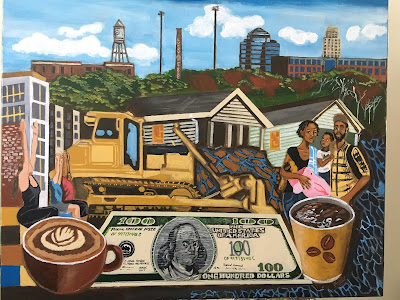How much black is too much?
How much black is not enough?
These are the type of questions that validate the truth of
white privilege. White people don’t have to think about being too white, or not
being white enough. White is simply white, and there’s not much to add to, or nullify
whiteness.
Being black is different.
Maneuvering between those fine
lines can be complicated for black folks in pursuit of excellence; while
maintaining street credibility.
Being labeled not black enough brings a level of shame that
is challenging to overcome. There are lines a person should never cross. Like a
black man dating a white woman, a black person claiming allegiance to the Republican
Party or worshiping on Sunday with a predominately white congregation.
Being too black brings another set of concerns – like being
too black to get a real job. Or, another among the list of stereotypes that causes
white women to call the police when a black person goes to a pool, attends a
barbeque or gets caught for walking, talking and being black. In these cases,
being too black is a function of simply being black.
That is all true, but this is about the outlandish pressure
placed on black people to prove they have enough blackness to qualify as an acceptable
black person. This is about what black people tend to do to each other to
eradicate the abundance of “Uncle Tom’s” and “Aunt Sally’s” positioned to pull
those crabs back to the bottom of the barrel.
Everywhere you look, black people are there to remind boys
and girls about proper dress, proper communication and to punish deviate
behavior. As my grandparents would say, how to act proper while in the presence
of white people. Those chastisements often left me wondering if being black
meant being more like white people.
Overcoming being too black comes with the high cost of not
being black enough.
“If you’re black and
middle-class…every day you’re [going to get] a lot of crap. You’re going to get
angry,” wrote Ellis Cose in “The Rage of the Privileged Class.
The anger comes from the space in the middle – being black
in hope of overcoming the obstacles created to hinder black people, juxtaposed
against the pain associated with overly rejecting blackness.
This is not a new burden. Frantz Fanon wrote about it in his
book “Black Skin, White Mask”. This classic, written in 1952, examines the psychological
burden of being black.
“[Educated blacks] Society
refuses to consider them genuine Negroes. The Negro is a savage, whereas the
student is civilized. "You're us," and if anyone thinks you are a
Negro he is mistaken, because you merely look like one.”
Placed within contemporary context, we uncover multiple layers
of labeling related to what it means to be too black or not black enough.
From a black Christian not being black enough due to the embrace
of the slave master’s Jesus, to those boys wearing baggy pants never amounting
to much due to their inability to adapt to the norms of society – finding a
place in the middle is a lifelong quest for success in the face of the need of inclusion.
These are the type of discussion normally held in the context
of defining cultural variables. For black people, it’s more about defining what
it means to be black. Being too black can potentially influence the path a
person takes, and not being black enough has bearing on how a person operates
as a representative of blackness among other black people.
A person can’t hide being black. It follows you wherever you
go, and it is used in constructing an evaluation of character. Is she too black
to fit, or is he not black enough?
The pride that comes with being black should not come with
so many restrictions. The hope and prayer of being true to yourself is often
entangled in the perceptions of others – both black and white. Freedom comes in
owning what it means to imagine new definitions of blackness.
For some, that a place in the middle.
For me, it’s a place with unlimited possibilities.


